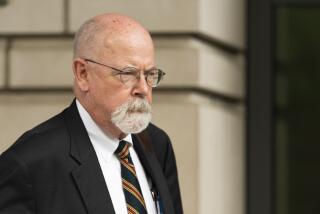Starr’s Own Shading
- Share via
Kenneth W. Starr’s mandate as independent counsel was to gather and evaluate evidence relating to possible wrongdoing by President Clinton and to report to Congress any information that might be a basis for impeachment. He was not to act as judge and jury in assessing whether Clinton deserves a punishment prescribed by the Constitution. That is solely Congress’ responsibility. Starr was to do his work free from partisan bias, as the “independent” in his title is meant to signify. Now Clinton’s lawyers charge that Starr’s report to Congress contains a “critical flaw” that deliberately distorts the case against Clinton and raises doubts about its fairness and the legal conclusions it draws. They have a point.
Two of the 11 potential grounds for impeachment cited in the independent counsel’s report stem from inferences that Clinton or someone acting in his behalf asked Monica S. Lewinsky to lie about their sexual relationship and that Lewinsky was promised a job in exchange for her silence. If true, this would support allegations of witness tampering and obstruction of justice. But in her testimony before the grand jury Lewin-sky denied both allegations. The Starr report’s interpretation of her testimony is that Clinton “never explicitly” told Lewinsky to lie or “explicitly” spelled out the job proposal. In fact, Lewinsky swore in plain words that these things never happened, and so far as is known there is no credible evidence to contradict those assurances. The Starr report can do no better than surmise that wrongdoing was accomplished indirectly, through winks and nods. But where is the proof?
It is significant that in the grand jury room Starr’s staff never directly asked Lewinsky whether she had been urged to lie or had been promised a job if she took part in a cover-up. It was left to a grand juror to get Lewinsky’s denial of these allegations on the record, by asking whether she had anything more she wanted to say.
In an ordinary criminal case a prosecutor who hid potentially exculpatory evidence from the defense would be in deep trouble. By trying to minimize and obscure the significance of Lewinsky’s denials, Starr has shaded the record and buttressed the suspicions of those who question his objectivity. None of this exonerates Clinton for his behavior or excuses him from the lies he told. But it does seem to weaken some of the case Starr has taken so long to construct and should alert Congress that it would be wise to regard the Starr report as something less than holy writ.
More to Read
Get the L.A. Times Politics newsletter
Deeply reported insights into legislation, politics and policy from Sacramento, Washington and beyond. In your inbox twice per week.
You may occasionally receive promotional content from the Los Angeles Times.










